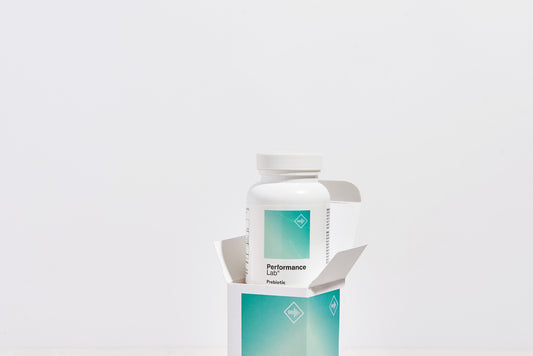Gut health is a popular topic of discussion.
You have healthcare practitioners preaching about the connection between gut health and disease, Instagram influencers showing you their favorite probiotic-rich meal, chefs giving tutorials on “gut-loving” recipes, and just about everyone in between shouting something about “LOVE YOUR GUT.”
There’s no denying that the health of your gut is important for your overall health and well-being.
Whether it’s mental health, joint health, cardiovascular health, or digestive health, there’s some sort of link between the balance of your gut bugs and the state of your health.
And because of this, we sit on the side of all the health-loving fellows and agree that keeping your gut healthy and happy means keeping your entire body the same way!
While most people will tell you that probiotics are a huge thing for supporting gut health, we have something a little bit different up our sleeve—they’re called prebiotics. And they’re the latest and greatest thing when it comes to keeping your gut balanced.
Key Takeaways
Not got time? Here are the highlights:
- Gut health is more than just how you digest food. Of course, the health of your gut impacts digestion, but it's also linked to mood, immunity, weight management, and more.
- Probiotics are living microorganisms that inhabit the intestine and offer positive health benefits.
- The goal of probiotic supplements is to repopulate and rebalance the gut microbiota, giving you more of what is good for you.
- Vegan probiotics can be obtained naturally through diet. Kimchi, sauerkraut, kombucha, and naturally fermented vegetables are all good sources.
- Not all probiotic supplements are vegan friendly. Even some vegetarian probiotics use dairy-derived components.
-
There are pros and cons to all probiotic supplements.
- Pros: Consistent dosage, targeted strains, and convenience are the key benefits.
- Cons: They need to be shelf-stable, alive at the point of ingesting, contain strains that harmonize with each other, and they need to be hardy in order to survive the acidity of the stomach. They also need feeding in order to thrive and colonize.
- Probiotics feed on prebiotic fiber. If they don't, they die. Prebiotics are non-digestible fibers that serve as food for beneficial gut bacteria, helping them thrive and multiply in our gut, giving us more of the good stuff.
- Prebiotics maximize the benefits of probiotics whether you get them naturally from your diet or from a daily supplement.
- Performance Lab® Prebiotic nourishes the good bacteria already living in your gut. Rather than consistently slinging probiotics in and hoping they make it to the intestine alive, Prebiotic nourishes those already there, so they can continue doing what they do best.
Shop Performance Lab® Prebiotic
What Are Probiotics?

Probiotics are the gut supplement we always hear about.
The live microorganisms that, when administered in high amounts, can offer a number of positive benefits for the person taking them1.
But the benefits aren’t an across-the-board thing—they differ depending on the strain you’re taking.
For example, Lactobacillus species naturally inhabit the small intestine and are great for supporting the gut barrier, bowel function, and immunity.
Bifidobacterium, on the other hand, reside in the large intestine (or colon) and support digestion, mood, and stress response. The different locations in your gut that bacteria reside translate to different health benefits.
Lactobacillus and Bifidobacteria are two of the most widely consumed probiotics, but there are other strains like Saccharomyces, Streptococcus, Enterococcus, Escherichia, and Bacillus.
Supplements can contain a single strain or a mix of many; single strains often are used to treat specific conditions rather than the gut’s overall health. But regardless of what you choose, the goal of probiotic supplements is to repopulate and rebalance the gut microbiota, thereby improving health outcomes.
With prebiotics, they work a bit differently. Prebiotics are not organisms per se; rather, they are the food that supplies these organisms' fuel. Just as humans and all other living, breathing species need food to survive, the good bugs in your gut do too.
And if you’re not feeding them what they need (i.e., prebiotic fiber), they’re going to die.
These prebiotics are selectively used by host microorganisms (your gut bacteria) and are able to manipulate host microbiota2.
Basically, taking prebiotics is important because they help nourish specific probiotic strains populating the gut rather than contribute additional strains.
Generally speaking, prebiotics are actually different types of complex carbohydrates. Because the body doesn’t have the enzymes needed to break them down, the microbes in your gut metabolize them to generate short-chain fatty acids (SCFAs) like acetate, propionate, and butyrate3. These SCFAs offer their own health benefits to the body.
Besides taking a prebiotic supplement, you can also get prebiotic fiber from many plant-based food sources, including:
- Chicory root
- Dandelion greens
- Jerusalem artichoke
- Garlic
- Onions
- Leeks
- Asparagus
- Apples
- Bananas
Why Is Gut Health Important?

Most people relate the gut to just the digestive system, and while the digestive system obviously plays a huge role in gut health, gut health is so much more.
Broadly speaking, the gut encompasses both the stomach and the intestinal tract, and when we’re talking about gut health, we’re referring to the balance of microorganisms populating these spaces; is it more good bacteria or more bad bacteria?
Gut health, directly and indirectly, affects your entire body. Here’s why maintaining a healthy and balanced microbiome is important for more than just your digestive system:
- Nutrient production (vitamin K, certain B vitamins)
- Mood regulation and mental health
- Digestion
- Joint health
- Cognitive function
- Hormonal balance
- Sleep
Signs of a Gut Imbalance
There are tests available to determine if you have dysbiosis, leaky gut, or any other digestive/gut issues, but some of the most common symptoms that will tell you something isn’t quite right are:
- Abdominal discomfort (gas, bloating, diarrhea, constipation)
- Mood imbalances
- Poor focus and concentration
- Skin issues (eczema, acne, dry, itchy skin)
- Sugar cravings
- Sleep disturbances
- Weight changes
- Poor immunity
If you’re struggling with any of these, chances are there’s something going on in your gut.
Can Probiotics Be Vegan?
The answer is yes they can.
While probiotics are living organisms, they are not sentient. Which means their cultivation and use don't conflict with vegan principles—as long as probiotic bacteria can be grown and consumed without involving animal products.
Natural Sources of Vegan Probiotics
Vegan probiotics occur naturally in several fermented plant-based foods including:
- Kimchi and sauerkraut: Tangy and loaded with the Lactobacillus species of probiotic.
- Unpasteurized Miso: Rich in umami and the gut-friendly Lactobacillus and Tetragenococcus halophilus.
- Kombucha: A fizzy, fermented tea popular for its digestive benefits.
- Pickled vegetables: As long as they are naturally fermented and not vinegar-pickled, these tend to contain Lactobacillus plantarum and Pediococcus species.
These options provide natural plant-based ways to support your gut microbiome.
Are Vegetarian and Vegan Probiotics the Same?
No, and this is where many people get confused.
A vegetarian probiotic might not contain meat-based ingredients, but it could still use dairy or animal-derived components during production. Vegan probiotics, on the other hand, avoid all animal products entirely—from the bacteria’s growth medium to the capsule materials.
What to Look For in a Vegan Probiotic Supplement?

This is where you'll need to do some digging. To be a true vegan probiotic, the supplement must meet specific criteria:
- No Dairy-Derived Growth Mediums Probiotic bacteria are often grown using lactose (a sugar from cow’s milk) as a food source. Vegan probiotics, however, are cultivated on plant-based or synthetic growth mediums.
- Vegan Capsules Many capsules are made with gelatin, which is derived from animal collagen. Vegan supplements use alternatives like hydroxypropyl methylcellulose (HPMC) or pullulan.
- No Hidden Ingredients Ingredients like magnesium stearate, used as a flow agent, may sometimes come from animal sources.
The best vegan probiotics ensure all components are plant-based and will have certifications on the label like "Vegan certified".
Pros and Cons of Vegan Probiotic Supplements
Pros
While naturally fermented foods are of course an excellent source of probiotics, taking a supplement is perhaps the most convenient way to incorporate probiotics into your day.
It takes the hassle out of meal planning, prep and can be taken on the go.
A supplement also offers additional benefits:
- Consistent Dosage: Supplements provide specific, measurable amounts of beneficial bacteria.
- Targeted Strains: Some probiotic supplements are formulated for specific health goals, such as supporting immunity, digestion, or even mood.
- Convenience: Easy to take daily, even when fermented foods aren’t readily available.
Cons
Probiotics focus on delivering beneficial strains to the gut. But this is not without challenges.
The life of a probiotic is not an easy one:
- We need them alive. Probiotic bacteria need to be alive at the point when we ingest them. Most are sensitive to heat and moisture. Between manufacture and our refrigerator—a lot can happen.
- They need to work together. Certain strains work better together, while others may compete for resources. Getting the right balance is key.
- They need to survive. Once ingested, the probiotic strains must pass through and survive the highly acidic stomach. Once through that treacherous territory, they'll have to endure bile salts in the small intestine. Some probiotic strains are more susceptible than others here.
- They need feeding. Probiotics rely on prebiotics as their food source. They need prebiotic fiber in order to colonize, thrive, and boost the existing population so we can feel the benefits.
If you're taking any kind of vegan probiotic, whether it be through diet or supplementation, prebiotics will optimize your healthy gut bacteria.
Why Prebiotics Matter
Digestive Health

The health of your digestive system relies heavily on the health of your gut and the populations of microbiota residing in it. When these populations become imbalanced, and the bad guys outnumber the good, it spells trouble for your entire body.
Because prebiotics support the growth of specific bacterial colonies already residing in the gut, research shows that prebiotics help to increase relative numbers of Lactobacillus and Bifidobacterium species, as well as alter bacterial metabolism.
When these bacteria are thriving, they produce large amounts of short-chain fatty acids that possess antimicrobial activity and enhance the integrity of the epithelium lining the gastrointestinal tract4.
When your gut barrier is sealed, toxins, pathogens, and undigested food particles cannot enter your bloodstream. This prevents food sensitivities, enhances nutrient digestion and absorption, and prevents chronic low-grade inflammation and disease development.
Weight Management

Did you ever think a healthy gut could help you lose weight? It can! Gut bacteria won’t have a direct effect on weight loss, but their activities have a rippling effect through your entire body, which can help to control weight by regulating energy expenditure, metabolism, and hormones.
Research shows that an imbalanced gut is linked to obesity, and that low fecal bacterial diversity is associated with adiposity and dyslipidemia, impaired glucose regulation, and higher levels of low-grade inflammation5, all of which contribute to body composition and weight.
A healthy microbiome may help to support weight loss by6:
- Affecting intestinal gene expression involved in energy balance
- Regulating intestinal barrier function
- Regulating satiety hormone release (leptin and ghrelin)
- Generating short-chain fatty acids (SCFAs)
- Regulating digestion and absorption of nutrients
Related Post: Do Probiotics Help You Lose Weight? - A Complete Guide
Mood and Brain Function

Your brain and gut work on something called the gut-brain axis, and the health of your gut has a lot to do with how well your brain functions. Changes in the diversity and health of the gut microbiome is an underlying factor involved in the development of several neurological disorders involving inflammation7.
Prebiotics help balance out the gut microbiome, leading to less inflammation and fewer cognitive symptoms.
Some research also finds that prebiotics may influence the central nervous system (CNS) by modulating neuroinflammation, which is important for treating cognitive impairment and mood disorders like anxiety and depression7.
Immunity

Do prebiotics help your immune system? Well, with more than 70% of your immune system residing in your gut, it should be pretty obvious that a healthy gut makes for a healthy immune system. Many components of the immune system are regulated by the microbiota populating the skin, oral cavity, gastrointestinal tract, genitals, and respiratory tract8.
When your gut bugs are imbalanced, there’s not enough of the good guys to support your internal and external defense mechanisms, hence why you get sick or ill.
Not to mention, the short-chain fatty acids produced by fiber fermentation help decrease the levels of systemic inflammation9, as well as modify the activity of various immune cells (neutrophils, monocytes, and macrophages)8.
Basically, an imbalanced microbiome is a breeding ground for inflammation and disease.
How To Support Your Gut

When it comes to supporting a healthy gut, there are loads of things you can do. A healthy diet is pretty much the best, but other things like stress management, proper sleep, physical activity, avoiding food triggers, and of course, supplementation are also key.
Probiotics are generally the number one supplement recommendation, but even with those, there are several things to consider. Is it shelf-stable, or does it need refrigerating? How many CFUs (colony forming units) does it contain? What strains are in it? What am I using it for?
Probiotics are highly specific to the condition you’re working with and what you’re looking to achieve, but the thing about prebiotics is that everyone needs them regardless of the condition.
Prebiotics aren’t like probiotics in the sense that specific strains cater toward helping certain bacteria flourish; prebiotics help the bacteria that already exist in your gut—no matter the strain. While yes, they do have a preference towards supporting certain ones, by no means do they discriminate.
And that’s the exact reason we love them so much.
Performance Lab® Prebiotic
With Performance Lab® Prebiotic, you’re getting a gut supplement that is several times more potent and more effective than any other probiotic supplement on the market.

Featuring Orafti® Synergy1, a patented blend of long- and short-chain inulin fibers derived from chicory root, this prebiotic supplement is specifically designed to nourish beneficial gut bacteria like Bifidobacterium.
Performance Lab® Prebiotic nourishes existing probiotic colonies rather than introducing new ones, delivering more reliable, natural, safe, and comfortable microbiome support. The addition of fiber helps to support healthy digestion, immune function, fat loss, and other benefits that you can’t get from conventional probiotic supplements.
Shop Performance Lab® Prebiotic
Final Thoughts
It may not seem like it, but your gut runs the show. And because we live in environments where everything seems to work against good gut health, taking the steps necessary to support your microbiome is critical.
That’s where Performance Lab® Prebiotic really shines. Rather than constantly adding in new strains to balance the gut and fix the problem, it nourishes those already in there so they can continue to do what they do best.
- C Hill, F Guarner, G Reid, et al. Expert consensus document. The International Scientific Association for Probiotics and Prebiotics consensus statement on the scope and appropriate use of the term probiotic. Nat Rev Gastroenterol Hepatol. 2014;11(8):506-514.
- GR Gibson, R Hutkins, ME Sanders, SL Prescott, RA Reimer, SJ Salminen, et al. Expert consensus document: The International Scientific Association for Probiotics and Prebiotics (ISAPP) consensus statement on the definition and scope of prebiotics. Nat Rev Gastroenterol Hepatol 2017;14:491-502.
- HD Dietary fiber and prebiotics and the gastrointestinal microbiota.Gut Microbes. 2017;8(2):172-184.
- EMM Quigley. Microbiome-Directed Therapies: Past, Present, and Future. Clinical Gastroenterology and Hepatology 2019;17:333–344.
- E Le Chatelier, T Nielsen, J Qin, et al. Richness of human gut microbiome correlates with metabolic markers.Nature. 2013;500(7464):541-546.
- Rivera-Piza A, Lee SJ. Effects of dietary fibers and prebiotics in adiposity regulation via modulation of gut microbiota. Appl. Biol. Jan 2020; 63(2).
- IHR Paiva, E Duarte-Silva, CA Peixoto. The role of prebiotics in cognition, anxiety, and depression. Eur Neuropsychopharmacol. 2020;34:1-18.
- R Corrêa-Oliveira, JL Fachi, A Vieira, FT Sato, MA Vinolo. Regulation of immune cell function by short-chain fatty acids.Clin Transl Immunology. 2016;5(4):e73.
- Rebecca F McLoughlin, Bronwyn S Berthon, Megan E Jensen, Katherine J Baines, Lisa G Wood,Short-chain fatty acids, prebiotics, synbiotics, and systemic inflammation: a systematic review and meta-analysis. The American Journal of Clinical Nutrition,Volume 106, Issue 3, 2017














